Athens, the city of philosophers and the cradle of Western civilization, is a must-visit for anyone eager to trace how our modern world was shaped by ideas born around the slopes of the Acropolis. Its myths, gods, monuments, and legends have fascinated historians for centuries, and no trip to Greece is complete without experiencing its capital. You could spend days exploring Athens’ rich past through its architecture and museums and still barely scratch the surface. But if you’re short on time, these Athens history tours capture the essence of over two millennia of the city’s legacy, guiding you through the highlights that define its enduring story.
Athens history: Timeline of events
- c. 5000 BCE: Early Neolithic settlement in areas like Kerameikos
- c. 1600 BCE: Mycenaean palace built atop the Acropolis
- c. 1200 BCE: Collapse of the Mycenaean world but Athens survives, leading to new settlements on Acropolis slopes.
- c. 1050 BCE: Legendary King Theseus unites Attica. This marks the beginning of Athens’ mythos.
- c. 700 BCE: Rise of aristocratic Eupatridae class; myth of Cecrops takes root.
- 514–510 BCE: End of tyrannical rule, setting stage for democracy.
- 508 BCE: Cleisthenes establishes democracy
- 490–480 BCE: Persian Wars; devastation of the early Acropolis structures (Pre-Parthenon) after the Persian attack.
- 447–432 BCE: Construction of the Parthenon, Propylaea, Erechtheion, and Temple of Athena Nike.
- 399 BCE: Socrates was executed. This was also the time when the foundation of classical philosophy sites such as Plato’s Academy and Aristotle’s Lyceum was laid.
- 146 BCE: Athens falls to Rome, marking a period of decline and Roman rebuilding projects, including the Library of Hadrian and Temple of Olympian Zeus.
- 267 CE: Barbarian invasions lead to damage, but the Parthenon is periodically restored.
- 529 CE: Closure of classical schools by Justinian; Parthenon converted to a Christian church (6th century), then later a mosque under Ottoman rule (1456).
- 1687 CE: Parthenon suffers severe damage during Venetian siege.
- 1801 CE: Elgin Marbles removed from the Acropolis and shipped to Britain.
- 1834 CE: Athens declared capital of independent Greece; modern city begins to develop around ancient ruins.
- 1896 CE: First modern Olympic Games held at Panathenaic Stadium.
- 2004 CE: Athens hosts the Olympics and inaugurates modern infrastructure including the new metro.
Must-see historical sites in Athens
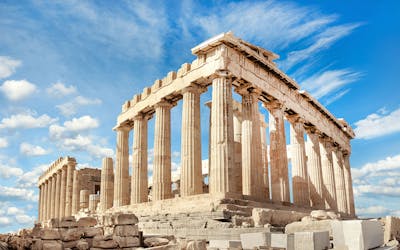
Crowning the city, the Acropolis is Athens’ most iconic landmark. It’s a symbol of democracy and artistic achievement. Home to the Parthenon, it offers sweeping views of modern Athens and showcases the architectural mastery of ancient Greece.
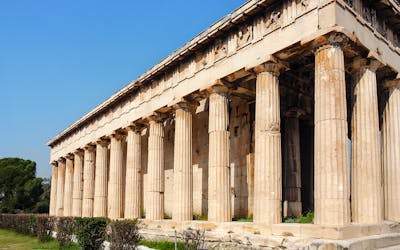
Once the heart of Athenian life, the Ancient Agora was where philosophers debated, politicians gathered, and democracy took root. Walking its ruins today feels like stepping into the birthplace of civic thought and public discourse.
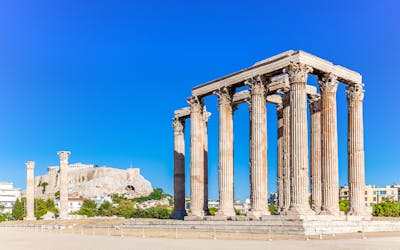
Dedicated to the king of the gods, this colossal temple took over 600 years to complete. Its towering Corinthian columns still hint at the ambition and grandeur of an empire that once ruled the ancient world.
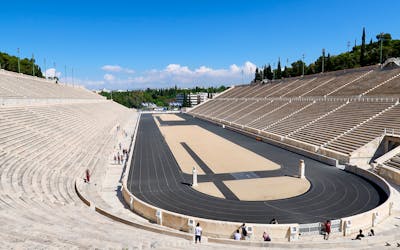
Built entirely of marble, the Panathenaic Stadium hosted the first modern Olympic Games in 1896.
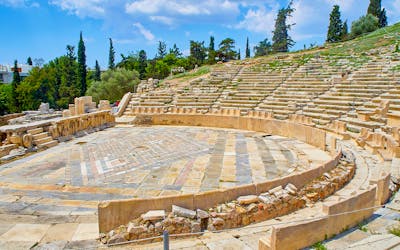
Carved into the southern slope of the Acropolis, this is where Greek drama was born. The plays of Sophocles and Euripides unfolded here.
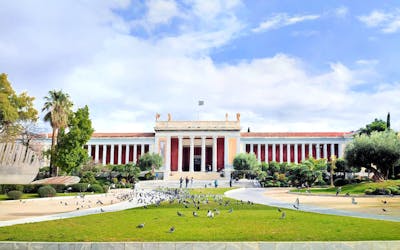
Home to a rich collection of ancient Greek art, the museum traces Greece’s evolution from myth to history.
Recommended Athens history tours

